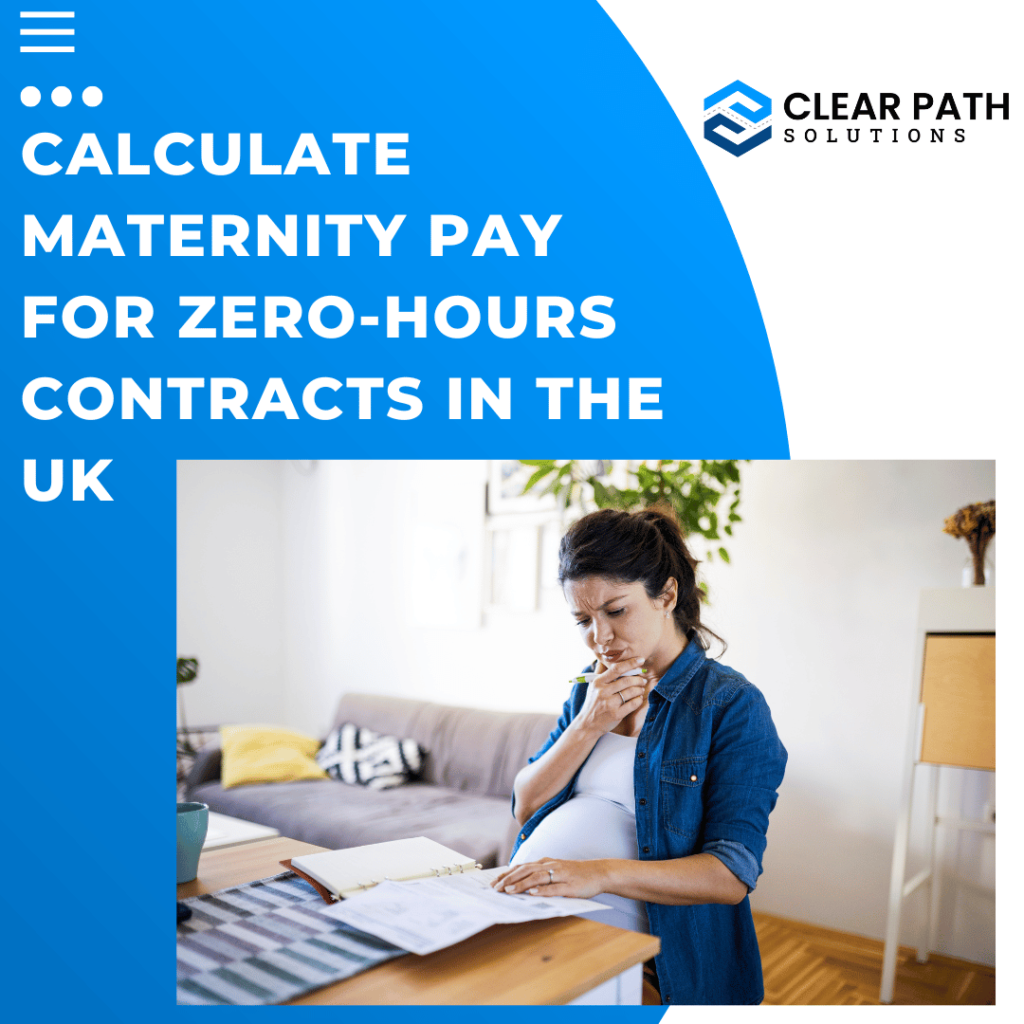Calculating Maternity Pay for Zero-Hours Staff – Clear Path Solutions
Maternity leave and pay are legal rights afforded to eligible employees in the UK. However, when it comes to calculating maternity pay for employees on zero-hours contracts, things can become complicated. Unlike traditional employment arrangements, zero-hours contracts involve irregular hours and inconsistent income, making standard calculations more challenging.
As an employer, ensuring you comply with UK employment law is essential—regardless of the type of contract. At ClearPath UK, we specialise in helping UK employers stay compliant with complex HR legislation, including maternity rights for non-traditional workforces.
This blog walks you through everything you need to know to accurately calculate maternity pay for your zero-hours staff.
How to Calculate Statutory Maternity Pay (SMP) for Zero-Hours Employees
Calculating Statutory Maternity Pay (SMP) for employees on zero-hours contracts can feel complex due to fluctuating hours and irregular pay patterns. However, UK employment law ensures that zero-hours employees who qualify are entitled to the same SMP as full-time staff—based on their average earnings.
Below is a step-by-step breakdown of how to accurately calculate SMP for zero-hours employees.
Step 1: Determine Average Weekly Earnings (AWE)
To start, you’ll need to calculate the employee’s Average Weekly Earnings (AWE). This figure determines both eligibility and the amount of SMP an employee will receive.
Here’s how:
- Identify the qualifying period—this is the 8-week period ending with the 15th week before the baby is due.
- Add up the total gross earnings (before tax and deductions) received during these 8 weeks.
- Divide the total earnings by 8 to get the average.
Note: If the employee didn’t earn wages in one or more of those 8 weeks (due to lack of shifts), you can use the most recent 8 paid weeks to calculate the average—provided this aligns with HMRC guidance and maintains fairness.
Step 2: Apply the SMP Formula
Once you have the AWE, apply the standard Statutory Maternity Pay (SMP) formula:
- First 6 weeks: 90% of the employee’s AWE (no cap).
- Next 33 weeks: Either £184.03 per week (rate for 2024–25) or 90% of AWE, whichever is lower.
This means employees earning less than the standard rate will continue receiving 90% of their average weekly pay, while higher earners may see a cap applied during the final 33 weeks.
Example Calculation
Let’s look at an example to bring this to life.
Scenario: Olivia – Zero-Hours Worker in Retail
- Olivia is employed on a zero-hours contract and has worked irregular shifts over her qualifying period.
- During her most recent 8 paid weeks, she earned the following:
| Week | Gross Pay |
|---|---|
| 1 | £180 |
| 2 | £210 |
| 3 | £150 |
| 4 | £190 |
| 5 | £160 |
| 6 | £170 |
| 7 | £200 |
| 8 | £180 |
Step 1 – Calculate AWE:
- Total earnings: £1,440
- AWE = £1,440 ÷ 8 = £180
Step 2 – Apply SMP Formula:
- First 6 weeks: 90% of £180 = £162 per week
- Next 33 weeks: Lower of £184.03 or 90% of AWE = £162 per week
Total SMP: Olivia is entitled to £162 per week for the full 39-week statutory maternity pay period.
Additional Considerations
- Fluctuating pay? Employers must ensure that any unpaid or underpaid weeks are fairly handled when averaging earnings. Omitting unpaid weeks in line with HMRC guidance is key.
- Bonuses or holiday pay received during the qualifying period should be included in the gross pay calculation.
- Employer Reimbursement: Most UK employers can reclaim 92% of SMP through HMRC. Small employers (qualifying for Small Employers’ Relief) can claim up to 103%.
Need Help Navigating Zero-Hours Maternity Pay?
At ClearPath UK, we specialise in employment compliance and payroll accuracy for UK-based businesses. Whether you need help verifying eligibility, calculating SMP, or ensuring accurate recordkeeping, our expert advisors are here to help you stay compliant and confident.
What If the Employee Doesn’t Qualify for SMP?
If your zero-hours worker doesn’t meet the criteria—particularly the earnings or continuous service requirement—they may still be eligible for Maternity Allowance (MA).
This is usually claimed through Jobcentre Plus and requires:
- Proof of earnings
- A completed SMP1 form (which you must issue if you deny SMP)
- A MAT B1 certificate
Maternity Allowance Rates (2024–2025):
- £184.03 per week OR 90% of AWE—whichever is lower
- Paid for up to 39 weeks
What Is a Zero-Hours Contract?
A zero-hours contract is a type of flexible employment agreement where the employer is not obliged to offer a minimum number of working hours, and the employee is not required to accept any work offered. These contracts are particularly common in industries such as:
- Retail
- Hospitality
- Care and support services
- Warehousing and logistics
Despite the flexibility these contracts offer, many individuals working under them are legally classified as employees. This classification is crucial when determining eligibility for maternity rights under UK law.
Are Zero-Hours Workers Entitled to Maternity Pay?
Yes. Employees on zero-hours contracts may still be eligible for Statutory Maternity Leave and Statutory Maternity Pay (SMP)—provided they meet certain conditions. If they don’t qualify for SMP, they may still be entitled to Maternity Allowance (MA) through Jobcentre Plus.
The first and most important step is to confirm whether the individual qualifies as an employee under the Employment Rights Act 1996.
Eligibility Criteria for Statutory Maternity Pay (SMP)
To qualify for SMP, the zero-hours employee must:
- Be employed by you continuously for at least 26 weeks into the 15th week before the baby is due.
- Earn on average at least £123 per week (as of April 2024) during the qualifying period.
- Provide you with at least 28 days’ notice of when they want to start their maternity leave.
- Submit a MAT B1 form (maternity certificate from their doctor or midwife).
If your employee doesn’t meet these criteria, you must provide them with form SMP1, allowing them to apply for Maternity Allowance instead.
What Is the Qualifying Period?
The qualifying period is the 8-week window leading up to the 15th week before the baby’s due date. You’ll use this period to calculate the employee’s average weekly earnings (AWE)—even if their hours or earnings vary from week to week.
This is especially relevant for zero-hours employees whose income might fluctuate due to irregular work schedules. Make sure you include all types of pay, such as:
- Regular hourly wages
- Overtime
- Holiday pay
- Bonuses or commission (if applicable)
Continuous Employment and Zero-Hours Contracts
For zero-hours employees, establishing continuous employment is key. Gaps in work do not necessarily break continuity, especially if:
- The contract remains in place
- The worker remains on your roster or payroll
- You maintain a mutual obligation to offer and accept work
ClearPath UK can help assess employment status and continuity if you’re unsure.
What Are Your Responsibilities as an Employer?
Even if your workforce is largely flexible or part-time, your legal obligations are not. For all employees, including those on zero-hours contracts, employers must:
- Assess maternity pay eligibility fairly and consistently
Maintain accurate pay records for at least 3 years
Provide written confirmation of maternity rights and entitlements
Avoid discrimination or unfair treatment related to pregnancy or leave
Failure to meet these duties can result in employment tribunal claims and reputational damage.
Why Employers Get This Wrong
Zero-hours contracts add complexity to what should be a standard statutory process. Employers often:
- Assume irregular workers don’t qualify for SMP
- Miscalculate AWE due to inconsistent hours
- Delay issuing important forms like SMP1
- Fail to classify zero-hours workers as employees
If you’re unsure, expert advice can save you time, stress, and legal risk.
Let ClearPath UK Guide You
At ClearPath UK, we understand the compliance challenges faced by employers with diverse workforces. Our team of UK employment experts can help you:
Assess employee status on zero-hours contracts
Calculate SMP correctly and avoid HMRC penalties
Implement legally sound maternity and parental leave policies
Need support? We’re here to help.
Final Thoughts
Calculating maternity pay for zero-hours workers in the UK may be more complex—but it’s far from impossible. As long as the individual qualifies as an employee and meets the statutory conditions, they’re entitled to maternity leave and pay just like any other staff member.
With ClearPath UK by your side, you can ensure all your employment practices—zero-hours contracts included—are fair, compliant, and easy to manage.
Need a tailored maternity policy for your organisation? Get in touch with us today and ensure you’re staying compliant the smart way.





